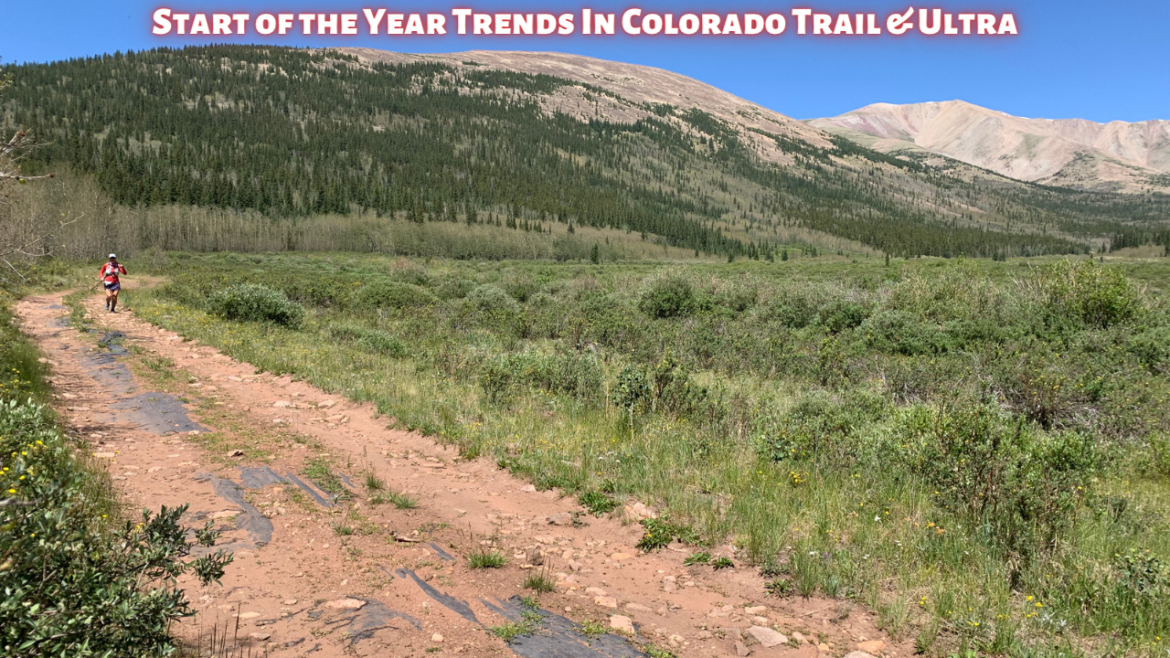By HPRS RD John Lacroix
This article is a follow up to the two articles I recently wrote for the HPRS blog. Those articles include my “State of Our Sport Address: January 2023” and “A Review of the 2022 Colorado Ultra Scene.” In this follow-up I wanted to discuss what has already been realized regarding the predictions I made in the previous two articles, our “realized trends,” focusing primarily on the Colorado trail and ultra-scene.
First, I want to bring to your attention the 2022 Trends Report put out by our registrar RunSignUp.com. This trends report is crucial in validating the discussions had in the two reports referenced above. You can read the trends report by CLICKING HERE.
Discussion
Last week I learned that a race director for one of Colorado’s most prestigious trail marathons ended up sharing my “State of Our Sport Address” with the entirety of his race’s board. It is to my understanding that they had a fruitful discussion about inclusion at their event, primarily as it relates to non-binary categories and prizes. While some on the board recognize that it is time to move in a more forward direction on the topic, much of the board is still stuck in the past.
This is what I’m seeing this play out across the sport. There are a lot of race directors, and boards, who can’t seem to let go of old ways of thinking. They’re holding on for dear life, the idea that the race actually matters to a majority of their participants. I think the reality is that the race matters to them, in their own personal opinion. It’s difficult for some people to let go of this control and really embrace what the collective thinks, rather than just themselves and a small minority. This reminds me of the days when the Boston Marathon just couldn’t come around to the idea of letting a woman run.
What was communicated to me is that they feel “the competition” is “still so very important and vital to so many of the runners who participate” in their event, that they cannot yet justify shaking the competition to its core by adding non-binary options and prizes. I think this is incredibly sad. For one, it is evident within this type of discussion that the “older folks” in the group are unwilling to budge on this issue, unwilling to consider what the future of the sport looks like especially as Gen-Z gets more involved. Honestly, if you’re not going to start thinking about the things that are important (or not) to Gen-Z, you have to accept that they’re not going to be involved at all. I personally believe that being stuck in the mud on inclusion at this time, will ultimately be the cause of downfall in the future, that which may be hard to recover from.
Inclusion, equality, equity, diversity, and accessibility are not issues where one just waits around until it becomes something they need to address. This is what Western States just did. A non-binary runner won a golden ticket into their event, and now they must address the elephant in the room. Their policy isn’t perfect, but some could argue that they’re late to the party and they only addressed the issue because “well, now they have to.”
Another example of this is the Boston Marathon, who just last week implemented a pregnancy deferral policy for the first time. … THINK ABOUT THAT. The Boston Marathon took until 2023 to finally implement a pregnancy deferral policy. This is a decade too late in my opinion, and in the court of public opinion many would agree. They implemented a policy designed to be inclusionary in nature, and instead of everyone celebrating, a lot of folks are left to ask “What took you so long?”
With that in mind, now is a really good time for races to start asking themselves some important questions. Some of those questions revolve around if they want to be late to the party or not. Do they want to wait until it’s too late, and look ugly when they finally move forward? You can still honor “the race” while also honoring inclusion. You can still honor the competitive nature of an event, while still offering inclusion. To me it sounds like some folks are still trying to find every reason to keep certain people out, to prevent them from feeling welcomed, and all because of opinions that no longer hold water like they used to. I reminded the race director that I spoke to that, “while the competition is still important to some, you should really consider how many make up that “some.” It’s likely that less than 1% of the people in your race even have a prayer at winning the prize money and accolades, that means the other 99% are just there for the experience. Do you cater to the 1%, or the experience of the collective?”
Around the area: I noticed that Mad Moose has also started to add more shorter distances to events that have traditionally been just ultra. This is on top of more price increases across their entire series for the 3rd straight year; some prices increasing up to $35 over 2022.
GNAR runners announced that the 50k at one of their events is now cut-off free. “You’ve got 11 full hours to enjoy the course, with no worries about missing out mid-race.” Then a single cut-off during the 50-mile at the same event.
It appears as though those in our periphery are starting to catch on to the same trends discussed in both reports and are making adjustments as necessary. These adjustments are all focused on inclusivity and accessibility, and a need for our sport to shift away from focusing on podiums and the elite and more towards focusing on the collective experience for EVERY runner. It’s nice to see.
Dirty 30, traditionally the most expensive 50k in our state and one of the better attended despite the price, is no more. The race director reported the need to terminate both the Dirty 30 ultra, and her Silverton Ultra Dirty events due to being unable to acquire permits. There’s a much deeper story here that is being kept secret and it involves why the permits couldn’t be acquired. In my experience, permits are not just terminated without cause, or unable to be acquired without reason. I have some theories but don’t think it would be fair to address those here. I know for sure that the Dirty 30 has struggled to maintain a foothold at Golden Gate Canyon State Park, due to a massive increase in park visitation. It is my hope that other race directors can learn important lessons from this story; mostly as it pertains to the relationship between races and land managers as the ability to host events in busy areas becomes a challenge.
Ironman has already cancelled 8 (or more) of their events in 2023, continuing the 2022 trend of terminating events. Ironman did indeed experience its lowest level of participation over the last 15 years in 2022. They have laid off staff, and they continue to cut races out of their schedule in order to cut losses. Some of the events they’ve cut have taken place for decades, like Ironman Timberman in New Hampshire.
One final trend in the new year miff’s me… and that comes by way of the elite runners in ultrarunning. I have never seen so many elite runners publicly announcing their sponsorship intentions. These runners are announcing their moving on from one brand, like Hoka, and signing with another, like Brooks. I think this shows how tone deaf the elite in our sport have actually become, assuming that the lay runner actually cares what team they’re on or not. Maybe you do… I never have cared who is running for who.
Cost of Entry
As I have mentioned in other writings and on our podcast, I maintain a yearly spreadsheet of the registration fees for Colorado trail running events of a half marathon in length or longer. Where applicable I provide the information for all three tiers of pricing, and race day pricing. Some of this information is difficult to find as not all races publish their price increases, and some races have no price increases. Some races hide their pricing altogether (Hardrock).
Before we dive into this data, I want to admit that I may have missed listing some races. I have attempted to make as comprehensive a list as I possibly can. I had to decide the definition of a “trail” race, that is defined as any race that transpires on an actual dirt trail (that trail cannot be paved). Even if I missed a couple of races in each distance, I feel that their prices would have a minimal affect on the averages. I do not pretend that the sheet is perfect, but it does provide a decent snapshot into the realities of cost of entry.
As expected, the average cost of entry has increased. Ultra distances have realized a steeper increase than the shorter distances. Here is a brief analysis with screenshots of the numbers:
Half Marathons: Average $82, $93, $102
I count 41 trail half marathons in Colorado.
The average entry fee has increased $5-$7 compared to 2022.
5 (12%) races have yet to update their 2023 registration information.
17 (42%) races increased their entry fees in 2023.
The smallest increase is $5 and the largest is $20.
12 (29%) races did not change their entry fees from 2022.
2 races are new.
2 races I do not have data to compare to 2022.
One series abandoned tiered pricing and now offers a flat fee regardless of when you register.
Most expensive Half Marathons: Pikes Peak 30k ($115, $135, $150), Crested Butte 35k ($115, $135, $150) [The first 2 are Mad Moose Events], Leadville Heavy Half ($110), Adventurefest Fruita Trail Half ($105, $115, $125), Desert Rats Fruits Fest Half/UTMB ($105, $110, $125) [The last 2 are Gemini Adventures events]
Least expensive Half Marathons: Silver Rush 15-Mile ($50), Creede Mountain Half ($50, $60, $70), Runs with Scissors Half ($50, $65, $75), Continental Divide 16mi ($55, $65, $65)

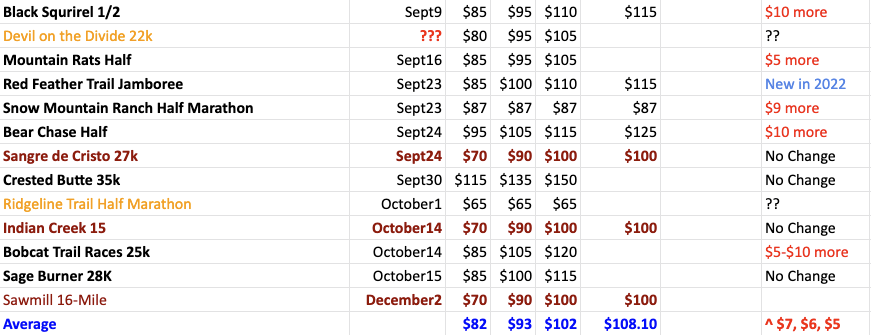
Marathons: Average $99, $109, $118
I count 20 trail marathons in Colorado. The average entry fee has increased $4 compared to 2022.
4 (20%) races have yet to update their 2023 registration information.
9 (45%) races increased their entry fees in 2023.
The smallest increase is $5 and the largest is $15.
6 (30%) races did not change their entry fees from 2022.
There are no new marathons.
One series abandoned tiered pricing and now offers a flat fee regardless of when you register.
Most expensive Marathons: Telluride Mountain Run 24 Miles ($150), Leadville Marathon ($130), Ram Party ($125, $140, $155), Silverton Alpine 26.2 ($120, $135, $150) [The last 2 are Aravaipa Events]
Least expensive Marathons: Creede Mountain 22 Mile ($60), Runs with Scissors Marathon ($60, $75, $85), Aspen Backcountry Marathon ($70, $80, $90), Run Through Time Marathon ($75, $85, $95)
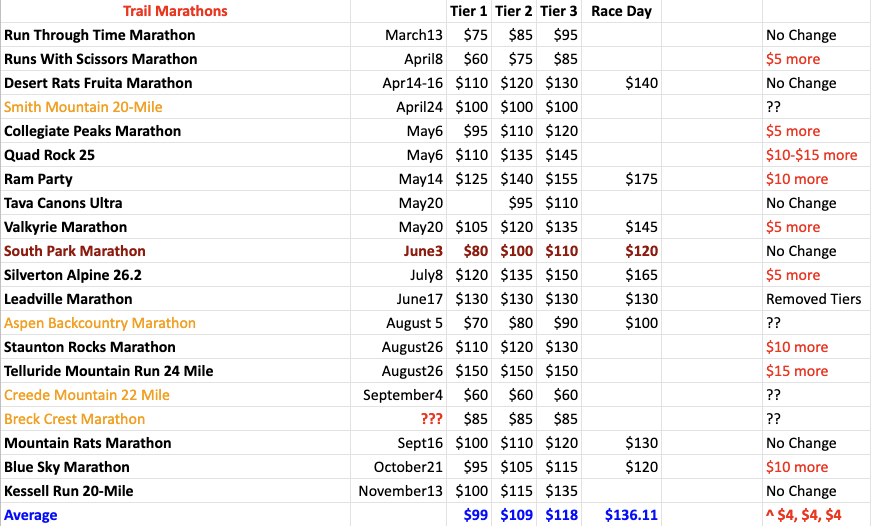
MOVING INTO ULTRAS…
50ks – 40-Milers: Average $118, $130, $139
I count 42 races between the distances of 50k and 40 miles in Colorado.
The average entry fee has increased $6-$7 compared to 2022.
7 (17%) races have yet to update their 2023 registration information.
18 (43%) races increased their entry fees in 2023.
The smallest increase is $5 and the largest is $35.
2 races decreased fees in a tier, but not necessarily overall.
11 (26%) races did not change their entry fees from 2022.
There are 3 new 50ks in 2023.
Most Expensive 50ks: Never Summer 60k by GNAR Runners ($165, $185, $205), Telluride Mountain Run 40-Mile ($180), Elk Mountain Traverse ($175), Kessel Run by Mad Moose ($150, $170, $190), Pike’s Peak 50k and Crested Butte 55k by Mad Moose ($155, $165, $180)
Least Expensive 50ks: Creede Mountain 50k ($60), Runs with Scissors 50k ($75, $95, $100), Devil on the Divide 50k ($80, $95, $105), Greenland Trail 50k ($90, $95, $100)
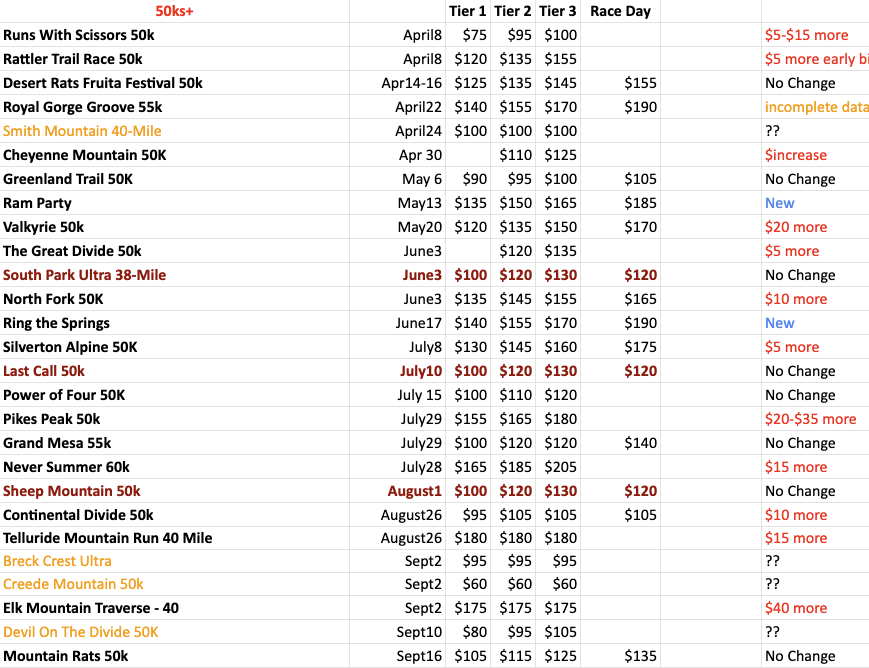

50-Milers: Average $157, $172, $183
I count 19 races of 50-miles in distance in Colorado.
The average entry fee has increased $9-$12 compared to 2022.
9 (47%) races increased their entry fees in 2023.
The smallest increase is $5 and the largest is $45.
1 race decreased their fees (Ram Party).
5 (26%) races did not change their entry fees from 2022.
There are 2 new races on the calendar, and one was re-added that had been previously removed.
One series abandoned tiered pricing and now offers a flat fee regardless of when you register.
Most Expensive 50-Milers: Run Rabbit Run ($195, $235, $290), Ouray ($265), San Juan Solstice ($220), Pike’s Peak and Crested Butte 50s by Mad Moose ($175, $195, $210), Mace’s Hideout ($180, $210, $210).
Least expensive 50-Milers: Collegiate Peaks 50 ($110, $125, $135), Grand Mesa 50 ($115, $135, $135), All HPRS Races ($120, $140, $150), Silver Rush 50 ($135).
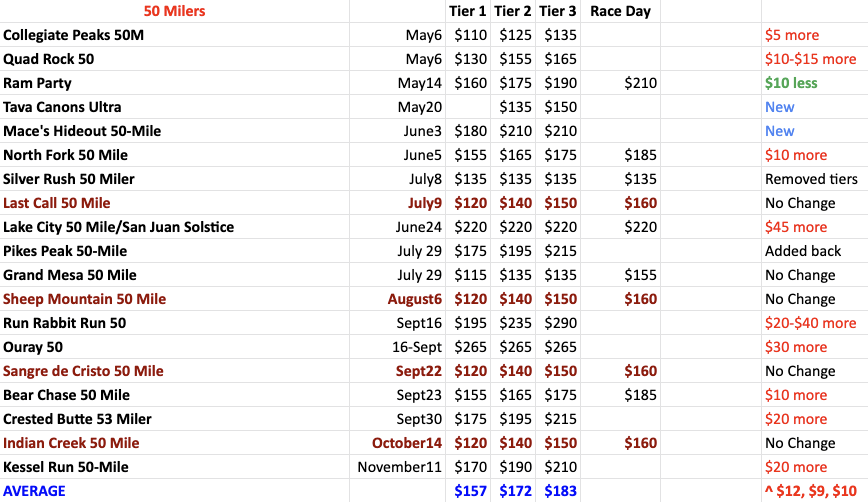
100ks: Average $195, $207, $221
I count 6 races of 100k in distance in Colorado.
The average entry fee has increased $18-$23 compared to 2022.
3 (50%) races increased their entry fees in 2023.
The smallest increase is $5 and the largest is $25.
1 race did not change their fees (HPRS).
2 races are new on the calendar.
Most Expensive 100ks: Ring the Springs 100k by Aravaipa ($225, $245, $265), Never Summer 100k by GNAR Runners ($215, $240, $260), Desert Rats Trail Festival/UTMB ($199)
Least expensive 100ks: Sangre de Cristo 100k by HPRS ($160, $180, $190), Bear Chase 100k ($175, $185, $195), The Great Divide 100k ($195, $215)

100-Miles: Average $350, $378, $387
I count 13 races of 100-miles in distance in Colorado.
The average entry fee has increased $7-$11 compared to 2022.
5 (38.5%) races increased their entry fees in 2023.
The smallest increase is $20 and the largest is $60.
5 (38.5%) races did not change their fees.
2 races decreased their entry fees, one $20 less (Mace’s) and the other $50 less (Divide).
1 race (Hardrock) I was unable to acquire their 2023 pricing information.
Most Expensive 100-Milers: High Lonesome 100 ($450), Run Rabbit Run ($325, $450, $475), Hardrock ($435?), Ouray ($425)
Least Expensive 100-Milers: The Great Divide 100-Mile ($280, $300), Silverheels & Sangre de Cristo by Human Potential ($300, $325, $350), Rio Grande and Creede by Tempest Adventures ($300, $350, $350).
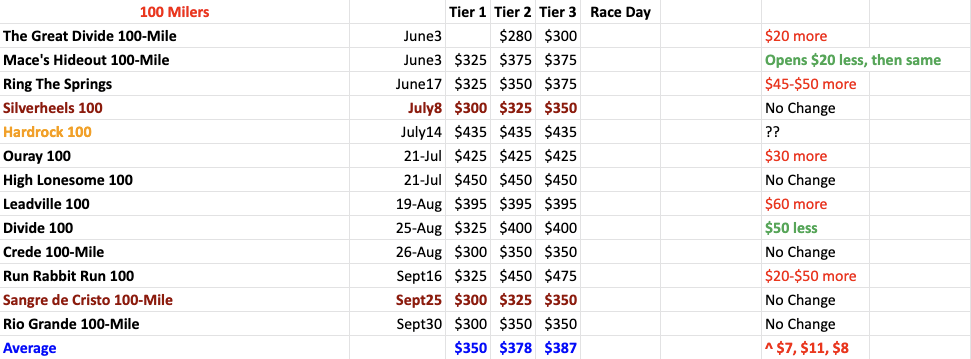
Timed Events
There is not enough of one singular category for timed events to ascertain trends. Here is the info on pricing of timed events.

We should also note that the following races are not returning in 2023, and they are the only ones as far as we know:
The Aspen Loop 40-Mile was cancelled in 2022 before it happened for the 1st time and is not returning in 2023.
As mentioned earlier, both the Dirty 30 and Silverton Ultra Dirty events have been terminated due to the race director’s inability to secure permits.
Sasquatch Running company is officially no more. After cancelling all of their events in 2020, they returned in 2021 with just the Happy Camper Fun Runs and Mount Herman Challenge. These two events were then cancelled in 2022, and Sasquatch cited a return in 2023. It appears as though they will not be returning at all now. These are their events that are now gone: Happy Camper Fun Runs, Mount Herman Challenge, Kickers for Kids, Lincoln Mountain Fun Run 6 and 12-Hour, Fox Run, Bear Creek Fun Run, Castlewood Canyon. They also previously owned 24-Hours of Palmer Lake who they have transferred ownership of to a new entity.
I know of at least one other event that might be cancelled this year. It features a 50-Mile, 25-Mile, and Half Marathon. The race director has not officially made the announcement yet while they continue to work on trying to figure out a new venue; it’s not looking good and a cancellation is expected.
I have also learned that at least one other series is going to be terminating three of their Colorado races after this year. They will hold these three events that are currently open for registration, and once they are done with producing these events in 2023 they will vacate the Front Range. These events do not have an official race director, and instead are being produced by area volunteers. I won’t say who it is at this time, but I will say it follows a prediction I made in my State of Our Sport address.
It is unknown at this time if the following events will be returning in 2023: Smith Mountain 40-Mile and 20-Mile in Delta, 24-Hours of Palmer Lake, and Breck Crest.
Races that are happening, yet prices are unknown: Hardrock 100, Run the Ranch, Hanging Flume 40k, Ridgeline Trail Fest, Above the Clouds, Devil on the Divide, Creede Mountain Runs, and Aspen Backcountry.

